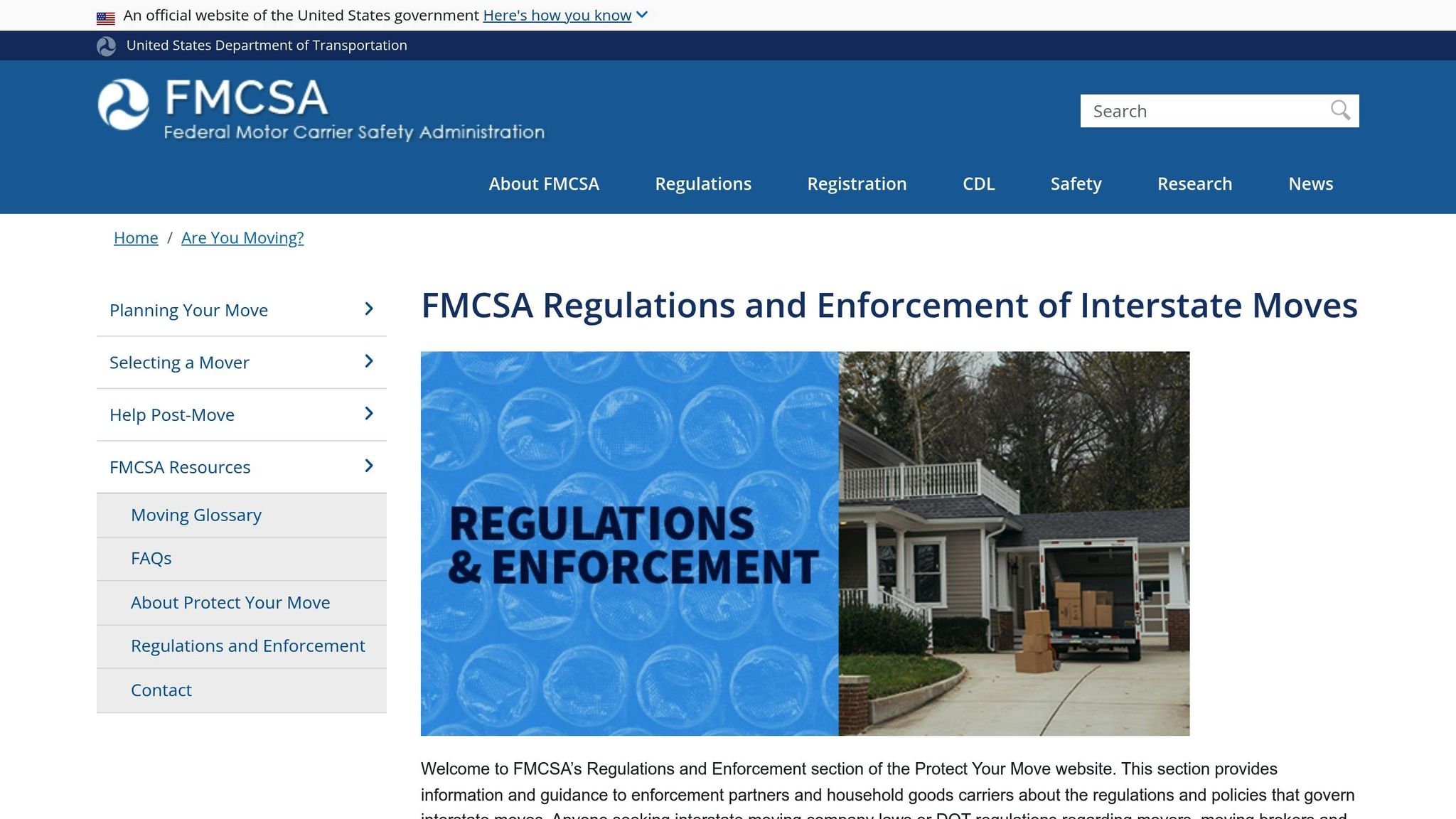What Movers Must Provide by Law

When hiring a moving company, you’re entitled to specific documents and protections by law. These ensure transparency, prevent fraud, and safeguard your belongings. Here’s what movers must provide:
- FMCSA Handbook: For interstate moves, movers must give you the "Your Rights and Responsibilities When You Move" guide, explaining your rights, dispute resolution, and regulatory contacts.
- Bill of Lading: A legally binding contract detailing your items, pickup/delivery info, costs, and insurance.
- Written Cost Estimate: Either binding (fixed price) or non-binding (approximate), with clear service breakdowns and no hidden fees.
- Insurance Coverage: Movers must offer two options:
- Released Value Protection: Basic, $0.60 per pound per item (included).
- Full Value Protection: Covers repair/replacement for an extra fee.
Always verify mover credentials (e.g., USDOT number for interstate moves) and review all paperwork carefully before signing. If issues arise, document everything and file claims within legal timeframes. These steps help ensure a smooth, secure move.
Demystifying Moving Documents📒: Your Guide to ...
Required Moving Documents
When you hire a moving company, you'll receive several legal documents that outline agreements, rights, and expectations. Here's what you need to know about the key paperwork.
FMCSA Rights Handbook

If you're moving to another state, federal law requires movers to give you the "Your Rights and Responsibilities When You Move" handbook from the Federal Motor Carrier Safety Administration (FMCSA). This guide:
- Explains your rights and the company's obligations.
- Details how to resolve disputes.
- Lists contacts for regulatory agencies.
You should get this handbook when you request a moving estimate or, at the latest, when you schedule your move. Make sure to review it thoroughly before moving day. Also, double-check the details on your Bill of Lading to confirm everything matches your agreement.
Bill of Lading
The Bill of Lading is the most critical document for your move. It's a legally binding contract between you and the moving company. This document must include:
- A detailed inventory of your items.
- Pickup and delivery addresses.
- Delivery date or time window.
- Payment terms and accepted methods.
- Valuation coverage details.
- The mover's contact information and DOT number.
Never sign a blank or incomplete Bill of Lading. Carefully review all the details before signing, as this document also acts as your receipt and is necessary if you need to file a claim.
Written Cost Estimate
Before your move begins, the company must provide you with a written cost estimate. There are two types of estimates:
| Estimate Type | Description | Legal Requirements |
|---|---|---|
| Binding | A fixed price that won't change if the shipment weight matches the estimate. | Must clearly state "binding estimate" and show the total cost. |
| Non-Binding | An approximate cost based on the estimated weight of your items. | Final charges cannot exceed 110% of the estimate. |
The written estimate should include:
- A breakdown of all services and charges.
- Payment terms and accepted methods.
- Any possible extra fees.
- The company's contact information and DOT number.
- A clear indication of whether it's binding or non-binding.
Save both digital and physical copies of these documents. Together, they create the legal structure that ensures your move is handled transparently and securely.
Legal Rights During Your Move
Understanding your rights ensures you receive proper service and protection throughout your move. Federal law provides clear safeguards for anyone hiring a moving company. These legal protections, combined with the required documentation, help cover all aspects of your move.
Insurance Coverage Options
Moving companies are required to offer two types of insurance coverage for your belongings:
| Coverage Type | Protection Level | Cost | Maximum Liability |
|---|---|---|---|
| Released Value Protection | Basic coverage at $0.60 per pound per item | Included in the moving cost | Limited compensation based on weight |
| Full Value Protection | Coverage for repair, replacement, or cash settlement | Additional fee based on value | Full current market value |
Always get the insurance details in writing and confirm your chosen coverage is clearly noted on all documents.
In addition to insurance, the terms of your move must be fully detailed in the documentation.
Complete Document Requirements
Federal law prohibits signing:
- Blank or incomplete documents
- Paperwork with undefined charges
- Documents that waive your rights
Every document should include:
- The moving company's legal name
- Their physical business address
- DOT number
- Contact information
- Detailed service descriptions
- A complete cost breakdown
Keep all records handy in case you need them for dispute resolution.
Steps to File a Claim
If problems occur despite having complete documentation, follow these steps to file a claim:
1. Initial Notification
Note any visible damage on the delivery receipt right away. You have up to 9 months from the delivery date to file a formal claim for damages.
2. Gather Documentation
Take photos of the damage and gather supporting documents like your Bill of Lading, inventory list, repair estimates, and receipts.
3. Submit the Claim
Send a written claim to the moving company. By law, they must:
- Acknowledge receipt within 30 days
- Resolve the claim within 120 days or provide a written explanation if denied
If the company doesn't respond or resolve your claim, file a complaint with the FMCSA using their National Consumer Complaint Database.
Signing the delivery receipt doesn’t prevent you from filing a claim later for damages discovered after delivery. However, noting visible damage at the time of delivery strengthens your case.
sbb-itb-290b89d
Moving Company Requirements
In the U.S., moving companies must comply with licensing and insurance regulations to operate legally. These rules ensure consumer protection and maintain service standards.
Required Licenses
The type of license a moving company needs depends on whether they handle local or interstate moves:
| Move Type | Required License | Issuing Authority | Purpose |
|---|---|---|---|
| Interstate | USDOT Number | Federal Motor Carrier Safety Administration (FMCSA) | Tracks safety records and identifies the company |
| Local/Intrastate | State License | State Licensing Authority | Ensures adherence to state-specific rules |
Interstate movers must prominently display their USDOT number on all official documents. This number allows customers to check the company's legitimacy and safety history. After confirming the licenses, it’s also essential to review the company’s insurance policies to ensure they meet legal standards.
Insurance Requirements
Moving companies are required to carry insurance to cover potential losses. This is a legal obligation, and failure to comply can result in penalties. Always verify that the mover’s insurance is current and sufficient to cover your belongings during the move.
Steps to Protect Your Move
Taking the right precautions before and during your move can help prevent unnecessary headaches. Here are some practical ways to safeguard the process:
Verify Mover Credentials
Before committing to a moving company, confirm their credentials. Check resources like the FMCSA website to ensure the company is properly licensed and in good standing. Platforms like MOD24 can also be helpful, as they list moving companies that are licensed, insured, and verified. Once you've confirmed their legitimacy, double-check that all documents match the verified details.
Carefully Review Paperwork
Go through every piece of moving paperwork before signing anything. Make sure the services and costs are clearly outlined and accurate. Keeping both digital and physical copies of these documents can be a lifesaver if any disputes come up later.
Conclusion
Understanding your legal rights and having the proper paperwork is key to a smooth and secure move. Federal law requires movers to provide critical documents like the FMCSA Rights and Responsibilities handbook, a detailed Bill of Lading, and a written cost estimate. These documents protect you legally and clearly outline the terms of your move.
Moving companies must also meet specific legal requirements, including proper licensing, sufficient insurance coverage, and compliance with delivery timelines. These rules are in place to protect you from scams and ensure professional service.
To safeguard your move, verify the company's credentials and carefully review all documentation. Keep a record of your interactions and provide accurate details about your move to get precise service estimates. If your schedule changes, notify the moving company promptly to ensure everything stays on track.
How MOD24 Helps

Legal compliance is a key factor in ensuring a safe and smooth move. MOD24 simplifies the process by featuring only moving companies that meet federal regulations. With an impressive 4.6 out of 5 rating from 370 customer reviews, the platform ensures your move is handled by trusted professionals.
MOD24 takes the guesswork out of verifying movers. Each company listed on the platform has its credentials thoroughly checked. This means you can access detailed profiles that include information on licensing, insurance, and service quality, along with live customer reviews to help you make informed decisions.
Booking through MOD24 is straightforward. The platform connects you with professional movers who have all the necessary documentation in place. Plus, their dedicated customer support team is ready to assist with anything from paperwork to scheduling adjustments and other moving-related concerns.
Here’s how MOD24 protects your move with its practical features:
- Instant Quote Comparison: Easily compare prices from verified movers in your area.
- Certified Documentation: Rest assured that every mover meets legal requirements.
- Live Reviews: Check real-time feedback from customers to gauge service quality.
- Premium Support: Get help with paperwork, scheduling, and any other moving needs.
These tools work together to ensure your move is both compliant and stress-free. MOD24 makes it easy to find reputable moving companies while keeping everything aligned with federal regulations and proper documentation.

5 Best Places to Live in the Bay Area in 2021
If you’re planning on relocating to this region, but you don’t want to reside in a crowded and expen...

7 Expert Tips on How to Move Efficiently
It's great to have a go-with-the-flow attitude regarding your relocation, but it’s even better to le...

How to Pack Fragile Items - Tips and Tricks From Moving Professionals
The part of relocating we probably dread the most is stressing about our belongings. Will they stay ...